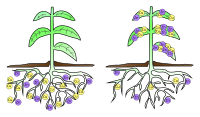Phytotreatment

Hey there little buddy! Have you ever watched plants grow in your garden or at school? Well, did you know that plants can also help clean up pollution in the soil and water? That's what phytotreatment is all about!
Let's say there's some pollution in the soil or water, like oil, pesticides or metals. Phytotreatment involves using plants to soak up or break down those pollutants, so they don't harm the environment or the animals that live there.
Just like you need food to grow big and strong, plants need something called nutrients to grow. When they're planted in polluted soil or water, they can absorb the harmful chemicals in the same way they absorb nutrients. The plants then break down or store the pollutants, keeping them out of the environment.
But not just any old plant will do. Scientists study different plants to see which ones are best at absorbing certain types of pollution. Some plants, like sunflowers, are great at taking in heavy metals, while other plants, like willows, are good at breaking down harmful chemicals.
So, when there's a pollution problem, scientists and engineers can choose the best plant for the job and plant them in the affected area. Then they just sit back and wait for the magic of nature to do its thing!
Overall, phytotreatment is a really cool way that plants can be used to make the world a cleaner, safer place for all living things!
Let's say there's some pollution in the soil or water, like oil, pesticides or metals. Phytotreatment involves using plants to soak up or break down those pollutants, so they don't harm the environment or the animals that live there.
Just like you need food to grow big and strong, plants need something called nutrients to grow. When they're planted in polluted soil or water, they can absorb the harmful chemicals in the same way they absorb nutrients. The plants then break down or store the pollutants, keeping them out of the environment.
But not just any old plant will do. Scientists study different plants to see which ones are best at absorbing certain types of pollution. Some plants, like sunflowers, are great at taking in heavy metals, while other plants, like willows, are good at breaking down harmful chemicals.
So, when there's a pollution problem, scientists and engineers can choose the best plant for the job and plant them in the affected area. Then they just sit back and wait for the magic of nature to do its thing!
Overall, phytotreatment is a really cool way that plants can be used to make the world a cleaner, safer place for all living things!
Related topics others have asked about:
